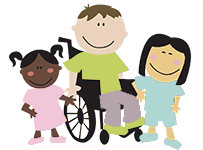Games Useful for Developing Speech, Language, and Social Skills
[vc_row][vc_column][vc_column_text]Children learn by observing and the best role model is the parent. Having a home environment in which learning is rewarded and encouraged, with games that are useful for developing speech, language, and social skills will be invaluable. It is important to always keep in mind that children observe and absorb everything they watch, so be conscious about how you behave in front of your child and try to make every activity fun and inclusive. Here are some examples of games you can play.
Language Games
 Playing games in the car can not only make a long trip a breeze, but it can serve as a fun, learning session for your child. Games such as the alphabet game can keep the brain engaged during long family trips and even on a shorter run, if your kid is not a fan of sitting on the car seat. Choose one side of the road and find words, on signs or license plates. The goal is to find every letter in the alphabet, in order, and the first person who completes it wins. You can play this game over several trips while running errands, if you keep a log of where you left off.
Playing games in the car can not only make a long trip a breeze, but it can serve as a fun, learning session for your child. Games such as the alphabet game can keep the brain engaged during long family trips and even on a shorter run, if your kid is not a fan of sitting on the car seat. Choose one side of the road and find words, on signs or license plates. The goal is to find every letter in the alphabet, in order, and the first person who completes it wins. You can play this game over several trips while running errands, if you keep a log of where you left off.
Even though you may be tempted to talk to a young toddler in “baby talk”, it is very important to start using adult words from an early age as much as possible. The child will get used to how the word sounds and its meaning and will expand their vocabulary by the time they enter pre-kindergarten. Not only that, if you get used to talking to your child in adult language, it will make them feel more grown up.
Speech Games
Tongue twisters such as “How much wood would a woodchuck chuck if a woodchuck could chuck wood?” are a really fun way of improving your child’s speech. There are multiple ways in which you can motivate your child. Either you can try to say a particularly hard tongue twister, or you can reward your child when they do. The strengths of this game focus on articulation, speech speed, and a sense of humor while learning.
Learning how to enunciate words properly is extremely important for your child’s development and the tongue twister game can be adapted as children grow and learn more words. It’s always funny when someone can’t say a tongue twister correctly and if you take it easy, everyone will have a good time.
Social Skills Games
Sharing and taking turns are two of the most important social behaviors you can teach your children, because they will help them make and keep friends at a young age. You can practice this skill every time your child interacts with other kids their age from the beginning and letting them know that it is not nice when they don’t take share or take turns.
Passing the ball while sitting at the park with another friend, waiting their turn to push a button or go down a slide, and sharing their toys are all valuable lessons your children learn in order to interact with others successfully. When they get older, playing games such as recognizing the facial expression, will help the child identify how a person may be feeling when interacting with them.
One of the most important things you can do for your child’s development is to turn the TV off and take away the pacifier. Your child thrives when they interact with you and their siblings, so the best way to engage the brain is to cut off the distractions and use your imagination to keep your child entertained, while learning.
Even if you are busy cooking dinner after work or cleaning on the weekend, you can keep your child engaged with games useful for developing speech, language, and social skills that will help them interact with peers and adults. Aside from the games we have mentioned here, there are countless options you can find online, if you are not sure how you can help your child. The important thing to keep in mind is that you are their first teacher and will continue to play an active role in their education and social development.[/vc_column_text][/vc_column][/vc_row]
